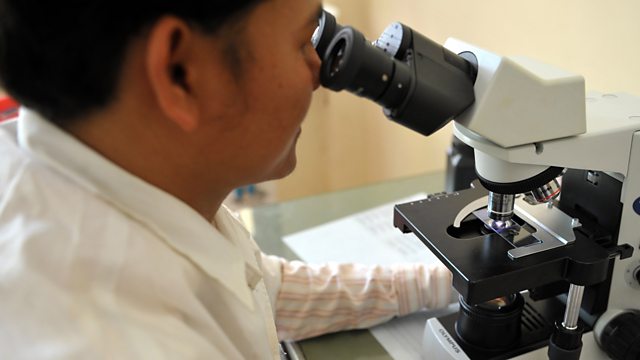
Drug-Resistant Malaria
Multidrug-Resistant Malaria in Southeast Asia; Hummingbirds research; MIT’s AI Quest; High blood pressure in new mums; Forever young bats; Childhood obesity; Lost satellite found
British medical researchers have investigated the origins and spread of a multidrug-resistant strain of malaria in Southeast Asia which is now causing great concern. According to Professor Dominic Kwiatkowski, the positive news is that the genomic techniques they have used to reconstruct this story can be employed to closely follow the strain’s for future spread, and (if implemented) better contain it. He speaks to Claudia Hammond about how delays in detecting the spread of resistance could threaten global efforts to eliminate malaria.
The Secrets of Hummingbird Flight Revealed
Slow motion videos of hundreds of hummingbirds have revealed the secrets to their remarkable manoeuvrability in the air. Roland Pease speaks to Professor Doug Altshuler from the University of British Columbia, who has captured and analysed hummingbirds from a small, portable studio that he had constructed, and where he could catch them in free flight.
MIT’s Intelligence Quest
MIT has launched the Intelligence Quest, an initiative to discover the foundations of human intelligence and drive the development of technological tools that can positively influence virtually every aspect of society. MIT are focused on advancing the science and engineering of both human and machine intelligence as James DiCarlo and Daniela Rus from MIT explain to Gareth Mitchell.
Undetected High Blood Pressure in New Mothers
Pre-eclampsia is one of the commonest complications of pregnancy. In severe cases, it can be life-threatening to mother and foetus but the risks to women don’t disappear after giving birth. It was known that women who had severe pre-eclampsia were at risk of persistent high blood pressure but a new study by Dr Laura Benschop at the Erasmus Medical Center in Rotterdam reveals that many of these women are not being diagnosed by standard clinic visits. She speaks to Claudia Hammond.
Forever Young Bats
Can bat science help human ageing research? New findings have shown that some long lived bat species do not age in the same way as other mammals. They do not even seem to posses the DNA repair enzyme most commonly found in the animal kingdom. Gareth Mitchell speaks to Emma Teeling of University College Dublin about the mystery of why bats seem to have evolved in this way.
Childhood Obesity
Can the city of Amsterdam help the world tackle the global epidemic of childhood obesity? In the last three years, the number of overweight and obese children has been reduced by 12%. Strict rules at school about pupils’ diets – and cycling – are parts of the story. Anna Holligan reports.
Lost Satellite Found
Have you lost a satellite? Do not worry, a computer geek will find it for you. That is exactly what has happened - an amateur space sleuth has detected signals from a Nasa satellite thought to have been 'lost' for years. Samanta Oon reports.
(Picture caption: Health worker looking at samples under a microscope at a health center in Pailin province – Credit: Tang Chhin Sothy/AFP/Getty Images)
The Science Hour was presented by Claudia Hammond with comments from freelance writer and columnist for ���˿��� Future, David Robson
Producer: Katy Takatsuki
Last on
More episodes
Previous
Broadcast
- Sat 10 Feb 2018 12:06GMT���˿��� World Service Americas and the Caribbean
Podcast
-
![]()
Unexpected Elements
The news you know, the science you don't

